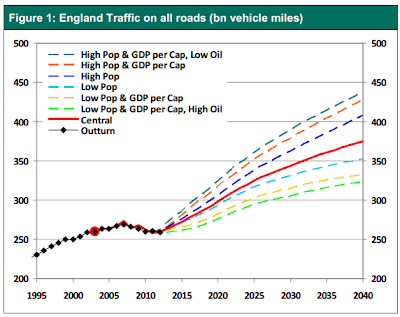The first thing to say about these is that if they are anything like as accurate as previous DfT forecasts, the actual trend in traffic will be much lower.
The other interesting thing is the section where DfT's forecasters try to explain why they got the London traffic trend so completely wrong (they forecast a drop of 1.5% between 2003 and 2010 but the actual drop was 7.8%, despite the population growing faster than anyone thought). They say:
In other words, London's experience shows that investment in public transport, congestion charging and road diets will reduce traffic sharply, which in most cases would remove the need for any new road building.We believe that the reason for this short-term model error and long-run discrepancy with other forecasts is due to:Car Ownership – the number of cars per person in London has been relatively flat over the last decade. While we have different car ownership saturation levels for different area types, including London, these may need to be re-estimated.Public Transport - London has seen high levels of investment in public transport, capacity and quality improvement on buses and rail based public transport. London will continue to see high levels of investment in public transport with increase in capacity into the future, e.g. Cross Rail. We will need to revisit our modelling on the impact this may have on car travel.Road capacity, car parking space cost and availability – There is evidence to suggest that In recent years London road capacity has been significantly reduced due to bus lanes, congestion charge and other road works. There is also a significant constraint and cost to parking in London which would reduce the demand to travel by car. We will need to revisit our modelling on the impact this may have on car travel.
So why are the government doing the opposite of what London did and plowing ahead with lots of road building? Who knows, but my hunch is that government ministers aren't actually interested in reducing congestion. After all, going by their actions the Conservatives' long-term strategy on this issue seems to be to let congestion and rise and then attack Labour for trying to address it with road-pricing. I've no doubt this is a succesful strategy in political terms, but it's terrible for the country as a whole.


In the US of A, prognosticators are seizing on current non-licensing and low VMT of the youth to emphatically declare the DRIVING BOOM IS OVER. This contravenes the criteria used by DfT here. I think we Yanks are cherry-picking stats to confirm our biases but what do I know. Do you tracks these young people numbers and what do you make of them?
ReplyDeleteTOM MURPHY